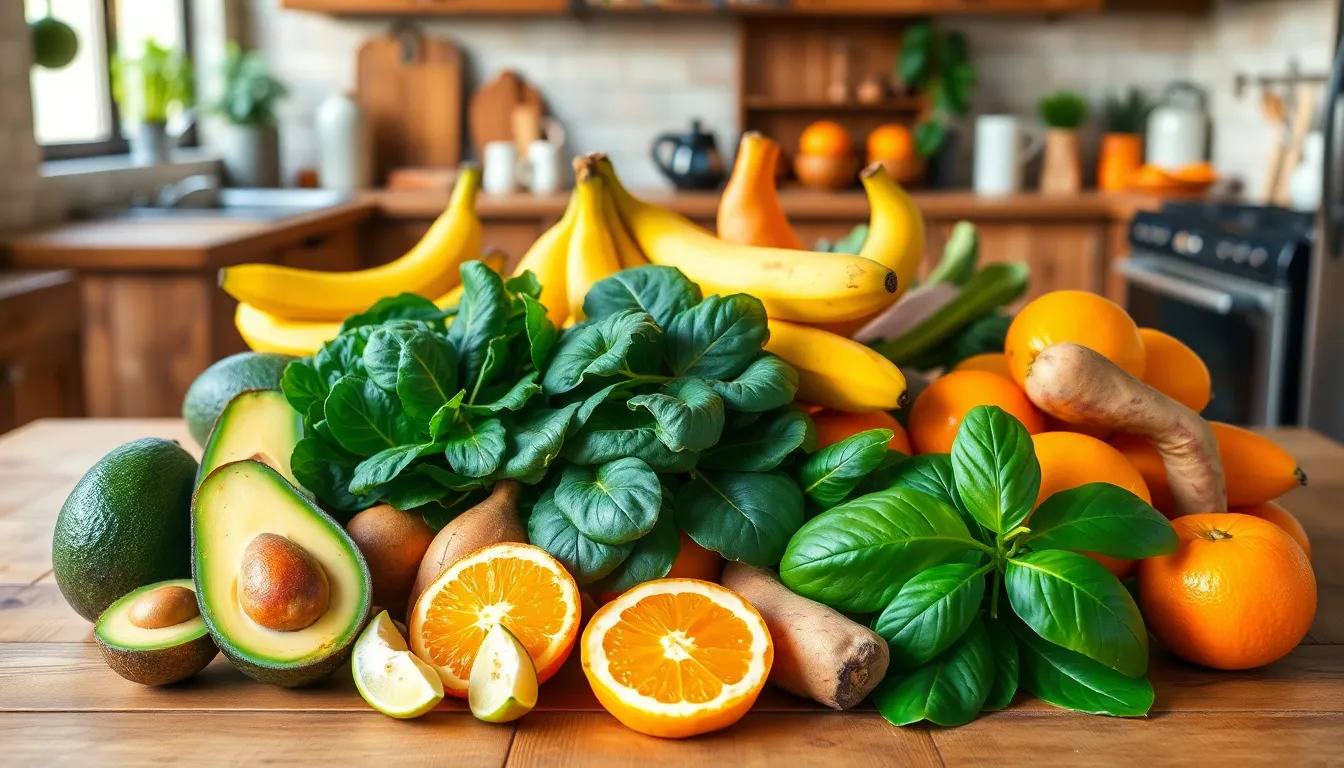In a world where bananas get all the potassium glory, it’s time to shine a spotlight on the unsung heroes of the potassium-rich food kingdom. These nutrient-packed powerhouses do more than just keep muscles cramping at bay; they help regulate blood pressure and support heart health. Who knew that munching on the right foods could feel like a superhero move?
Table of Contents
ToggleWhat Are Potassium-Rich Foods?
Potassium-rich foods are essential for maintaining overall health. They help regulate fluid balance, muscle contractions, and nerve signaling. Some of the top sources include leafy greens, fruits, vegetables, and legumes.
Leafy greens, such as spinach and Swiss chard, provide substantial potassium levels. An 8-ounce serving of cooked spinach contains around 840 mg of potassium. Additionally, sweet potatoes are excellent choices, offering approximately 950 mg of potassium in a medium-sized potato.
Fruits also deliver potassium effectively. Avocados stand out with about 975 mg per fruit. Bananas, often recognized as a potassium source, contain about 422 mg each, but many other options are available. Oranges provide around 237 mg per medium-sized fruit, while apricots yield about 427 mg per cup (dried).
Vegetables contribute significantly too. A cup of cooked beet greens contains about 1,300 mg of potassium. Broccoli, another nutritious option, offers about 457 mg per cooked cup. Tomatoes, both fresh and in sauces, yield notable potassium amounts as well.
Legumes such as lentils and beans serve as additional potassium sources. A cup of cooked lentils has around 731 mg, while kidney beans can provide about 607 mg per cup.
Including these potassium-rich foods in daily meals can enhance heart health and prevent hypertension. Consuming a variety of these nutritious options supports optimal bodily functions and overall well-being.
Benefits of Potassium-Rich Foods

Potassium-rich foods provide essential nutrients that contribute to overall health. Incorporating these foods into the diet offers multiple benefits.
Heart Health
Heart health significantly benefits from adequate potassium intake. It helps regulate blood pressure by balancing sodium levels in the body. A diet rich in potassium can prevent hypertension and support optimal cardiovascular function. Foods like avocados, spinach, and sweet potatoes play a pivotal role in maintaining heart health. Studies indicate that higher potassium consumption correlates with lower risks of stroke and heart disease. Those prioritizing potassium can improve their heart health and longevity.
Muscle Function
Muscle function greatly relies on adequate potassium levels. Muscles require potassium for proper contraction and relaxation. Consuming potassium-rich foods reduces the likelihood of muscle cramps and spasms during physical activities. Bananas, legumes, and leafy greens contribute significantly to muscle performance. Research demonstrates that athletes benefit from an increased potassium intake, as it enhances endurance and recovery. Maintaining potassium intake supports optimal muscle function and athletic performance.
Bone Health
Bone health improves with sufficient potassium in the diet. Potassium helps neutralize acids in the body, protecting bones from calcium loss. Foods such as oranges, potatoes, and yogurt strengthen bone density and health. Studies reveal a connection between higher potassium intake and reduced risks of osteoporosis. Ensuring adequate potassium can assist in developing strong bones, particularly in aging individuals. Prioritizing potassium-rich foods supports overall bone health and reduces fracture risks.
Top Potassium-Rich Foods
Potassium-rich foods contribute significantly to heart health, muscle function, and overall well-being. Incorporating a variety of these foods into daily meals can yield substantial health benefits.
Fruits
Bananas are often recognized for their potassium content, but many fruits provide similar benefits. Avocados contain about 975 mg of potassium per fruit. Oranges offer around 240 mg per medium-sized fruit. Tomatoes, whether fresh or in sauce form, also add potassium to the diet, delivering about 292 mg per cup. Kiwi, with approximately 215 mg each, and cantaloupe, providing roughly 267 mg, are excellent choices as well. Prioritizing these fruits not only enhances potassium intake but also adds essential vitamins.
Vegetables
Leafy greens dominate the list of potassium-rich vegetables. Spinach includes around 839 mg of potassium per cooked cup. Swiss chard follows closely with 961 mg per cup. Sweet potatoes also rank high, contributing about 448 mg per medium-sized potato. Broccoli offers an additional 457 mg per cooked cup. Carrots, with 390 mg per cup, enhance dishes while boosting potassium levels. Including these vegetables in meals supports various bodily functions and long-term health.
Legumes
Lentils are a powerhouse of potassium, supplying approximately 731 mg per cooked cup. Black beans add about 611 mg per cup, making them a popular choice in many cuisines. Kidney beans pack around 607 mg per cooked cup, offering versatility in dishes. Chickpeas not only provide about 476 mg per cup but also serve as an excellent protein source. Incorporating these legumes into meals enhances both potassium intake and overall nutritional value.
Nuts and Seeds
Nuts and seeds are often overlooked but offer significant amounts of potassium. Almonds contain around 208 mg per ounce. Sunflower seeds offer a hefty 262 mg per ounce. Pistachios yield about 291 mg per ounce, making them a delicious snack. Hazelnuts contribute approximately 193 mg per ounce, adding flavor to many dishes. Including these nuts and seeds boosts daily potassium consumption while providing healthy fats and proteins.
How to Incorporate Potassium-Rich Foods into Your Diet
Integrating potassium-rich foods into daily meals enhances health benefits significantly. Simple meal ideas encourage consumption of these nutritious options.
Meal Ideas
Start the day with a smoothie packed with spinach, bananas, and almond milk, providing a delicious potassium boost. For lunch, include a quinoa salad featuring diced avocado, tomatoes, and black beans. Dinner can feature roasted sweet potatoes alongside grilled chicken and steamed broccoli. Stir-fries offer flexibility, with options for using Swiss chard, bell peppers, and snap peas. Experimenting with lentil soup garnished with fresh herbs creates a nutrient-dense dish. Each meal provides essential potassium while supporting overall health.
Snacking Tips
Choosing snacks wisely boosts potassium intake throughout the day. Fresh fruit, such as kiwi or cantaloupe, serves as a hydrating and satisfying treat. Eating a handful of pistachios or sunflower seeds offers healthy fats and potassium. Veggies like carrot sticks or cucumbers pair perfectly with hummus, adding flavor and nutrients. Opting for yogurt topped with berries enhances nutrition while satisfying sweet cravings. Prioritizing these options leads to better potassium levels and overall well-being.
Incorporating potassium-rich foods into daily diets is a simple yet effective way to enhance overall health. By choosing a variety of fruits vegetables legumes and nuts individuals can ensure they’re meeting their potassium needs. This not only supports heart health and muscle function but also promotes strong bones and helps regulate blood pressure.
Making small changes like adding spinach to smoothies or enjoying sweet potatoes as a side dish can lead to significant health benefits. Prioritizing these nutrient-dense foods can empower individuals to take charge of their well-being and enjoy a healthier lifestyle.


